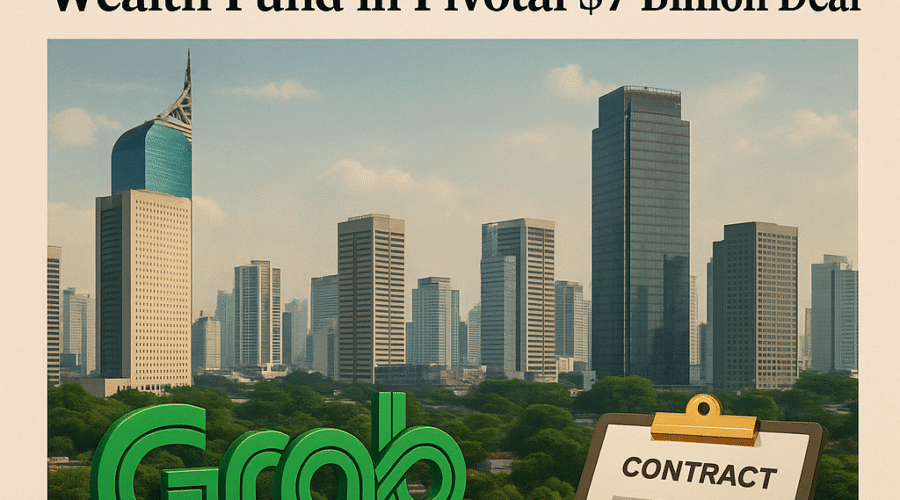Indonesia’s newly launched sovereign wealth fund Danantara is positioning itself as a key stakeholder in Southeast Asia’s most consequential tech merger of 2025 – Grab’s potential $7 billion acquisition of local champion GoTo. As first reported by Bloomberg News[9][10], Danantara’s early-stage negotiations to secure a minority stake in the combined entity reveal Jakarta’s strategic calculus: maintaining domestic control over critical digital infrastructure while attracting foreign capital. This high-stakes balancing act unfolds against mounting antitrust scrutiny[12][14] and nationalist concerns about foreign dominance in Indonesia’s $1.5 trillion digital economy.
💼 Seasoned CorpDev / M&A / PE expertise
Danantara’s Entry Reshapes M&A Dynamics
From Passive Investor to Strategic Arbiter
Launched in February 2025 with $61 billion in initial capital[6], Danantara represents Indonesia’s most ambitious attempt to modernize its state-owned enterprise (SOE) ecosystem. Unlike its predecessor INA – which focused on co-investments in infrastructure and healthcare[1][4] – Danantara wields direct authority over SOEs through its unique governance structure combining presidential oversight and Temasek-like operational autonomy[6]. Its potential involvement in the Grab-GoTo deal signals Jakarta’s determination to avoid a repeat of 2021’s controversial Sea Group expansion, where foreign investors captured 80% of Indonesia’s e-commerce growth.
Structural Safeguards Against Foreign Dominance
Danantara’s proposed minority stake (estimated at 15-20% by analysts) would create a three-way governance structure balancing Grab’s operational expertise (45-50%), GoTo’s local market dominance (30-35%), and state-aligned oversight[9][15]. This mirrors Indonesia’s “negative investment list” approach in natural resources, where foreign ownership caps preserve domestic interests. The fund’s involvement could ease regulatory concerns about data sovereignty and market concentration – the combined entity would control 78% of ride-hailing and 65% of e-wallet transactions nationally[12][14].
Regulatory Minefield Requires Diplomatic Navigation
Antitrust Watchdogs on High Alert
Indonesia’s Business Competition Supervisory Commission (KPPU) initiated preliminary merger reviews in May 2025, focusing on three risk vectors: price manipulation in ride-hailing algorithms, exclusionary practices in digital payments, and data monopolization in consumer behavior analytics[12][14]. Commissioner Muhammad Fanshurullah Asa emphasized that “any merger creating market shares above 50% triggers automatic Phase II investigation,” referencing 2023’s tightened merger control regulations[14]. Grab-GoTo’s combined market position in food delivery (68%) and instant payments (59%) suggests protracted regulatory review lasting 6-9 months.
Nationalist Sentiment in Tech Sovereignty Debate
The deal’s political sensitivity stems from GoTo’s symbolic status as Indonesia’s first homegrown tech unicorn. Nationalist lawmakers have proposed amendments to the 2023 Digital Economy Act that would classify ride-hailing and e-payment platforms as “strategic digital infrastructure,” subject to 51% domestic ownership requirements[13]. Danantara’s potential stake serves as a political compromise – maintaining foreign capital inflows while placating legislators like Faisal Basri, who warned that “surrendering GoTo would be our modern-day Cultuurstelsel”[13], referencing Indonesia’s colonial-era forced cultivation system.
Financial Engineering Meets Development Economics
Valuation Tightrope: Growth vs. Profitability
The proposed $7 billion valuation represents a 20% premium to GoTo’s May 2025 market cap[5][13], yet remains 64% below its 2022 IPO peak. Grab’s $2 billion loan financing (led by Citi and DBS)[9] incorporates innovative collateralization of future cash flows from GoTo’s financial services unit – a structure first tested in 2024’s Sea Group-Bank Jago deal[11]. Danantara’s entry could unlock additional financing through SOE-linked instruments like Pertamina’s commodity swap agreements or Telkom Indonesia’s data center REITs[6].
Synergy Projections and Development Mandates
Joint integration plans seen by analysts project $380 million in annual cost synergies through driver-merchant overlaps and AI-powered logistics optimization. More critically, Danantara insists on embedding development KPIs into the merger terms: 30% rural coverage targets for digital payments, carbon neutrality commitments for delivery fleets, and MSME onboarding quotas mirroring Bank Rakyat Indonesia’s microfinance programs[6][11]. These conditions echo INA’s ESG-linked infrastructure investments[1][4], adapting development finance mechanisms to tech M&A.
Broader Implications for Southeast Asia’s Tech Landscape
Domino Effect in Regional Consolidation
The Grab-GoTo talks accelerate consolidation trends across ASEAN’s digital economy. Singapore’s Temasek recently facilitated discussions between Sea Group and Vietnam’s MoMo, while Thai regulators approved True Corporation’s fintech JV with Ant Group under similar domestic oversight provisions. Danantara’s model of state-aligned minority stakes could become regional best practice, particularly for Vietnam’s proposed National Innovation Fund and Malaysia’s Khazanah 2.0 initiative.
Reconfiguring the Superapp Battleground
A successful merger would create a $27 billion entity (combined market cap) with unmatched vertical integration from ride-hailing to banking. This pressures competitors like ShopeePay and DANA to accelerate their own consolidation – Bank Central Asia’s $1.4 billion bid for DANA in June 2025 suggests the financial arms race is intensifying. For global investors, the deal underscores ASEAN tech’s maturation from growth-at-all-costs to sustainable monetization, with blended IRR targets of 18-22% for late-stage deals.
Conclusion: Redefining State Capitalism in the Digital Age
Danantara’s potential role in the Grab-GoTo merger represents a paradigm shift in emerging market tech investment. By marrying Temasek’s operational rigor with development finance institutions’ impact mandates, Indonesia is pioneering a hybrid model of state-aligned digital capitalism. The deal’s ultimate success hinges on balancing three competing imperatives: maintaining foreign investor confidence through transparent governance, achieving development targets without stifling innovation, and navigating ASEAN’s fragmented regulatory landscape. As Jakarta finalizes its position, all eyes turn to the Q3 2025 antitrust ruling – a decision that could either catalyze $50 billion in regional tech M&A through 2026 or reinforce nationalist barriers in Southeast Asia’s digital economy.
Sources
https://www.ina.go.id, https://ifswf.org/members/indonesia-investment-authority, https://en.wikipedia.org/wiki/Indonesia_Investment_Authority, https://thediplomat.com/2024/04/how-the-indonesia-investment-authority-built-its-portfolio-in-2023/, https://www.scmp.com/week-asia/economics/article/3310858/grabs-goto-takeover-bid-step-too-far-indonesia, https://www.aseanbriefing.com/news/indonesia-officially-launches-new-sovereign-wealth-fund-danantara/, https://thediplomat.com/2025/04/why-grab-wants-to-acquire-indonesias-goto-for-7-billion/, https://sponsored.bloomberg.com/article/bankofsingapore/direct-investments:-taking-a-targeted-approach-to-wealth, https://www.marketscreener.com/quote/stock/GRAB-HOLDINGS-LIMITED-130201011/news/Indonesia-wealth-fund-considers-stake-in-Grab-GoTo-deal-Bloomberg-News-reports-50173745/, https://www.tradingview.com/news/reuters.com,2025:newsml_L3N3S905R:0-indonesia-s-wealth-fund-danantara-weighs-role-in-7-billion-grab-goto-deal-bloomberg-news/, https://en.wikipedia.org/wiki/GoTo_(Indonesian_company), https://www.pymnts.com/cpi-posts/indonesias-antitrust-regulator-scrutinizes-potential-grab-goto-merger-amid-growing-speculation/, https://www.idnfinancials.com/id/news/54451/goto-buka-suara-soal-rumor-merger-dengan-grab, https://www.pymnts.com/cpi-posts/indonesias-antitrust-watchdog-probes-potential-risks-of-grab-goto-merger/, https://www.marketscreener.com/quote/stock/GRAB-HOLDINGS-LIMITED-130201011/news/Indonesia-wealth-fund-considers-stake-in-Grab-GoTo-deal-Bloomberg-News-reports-50173633/





